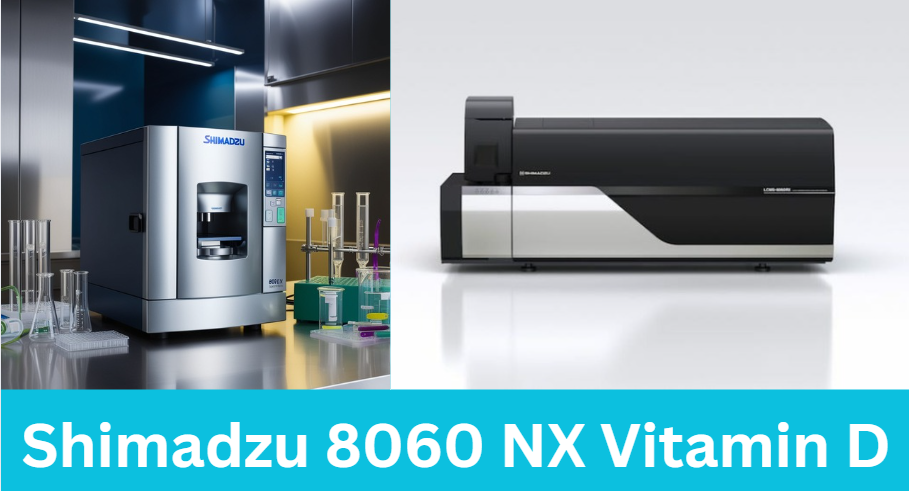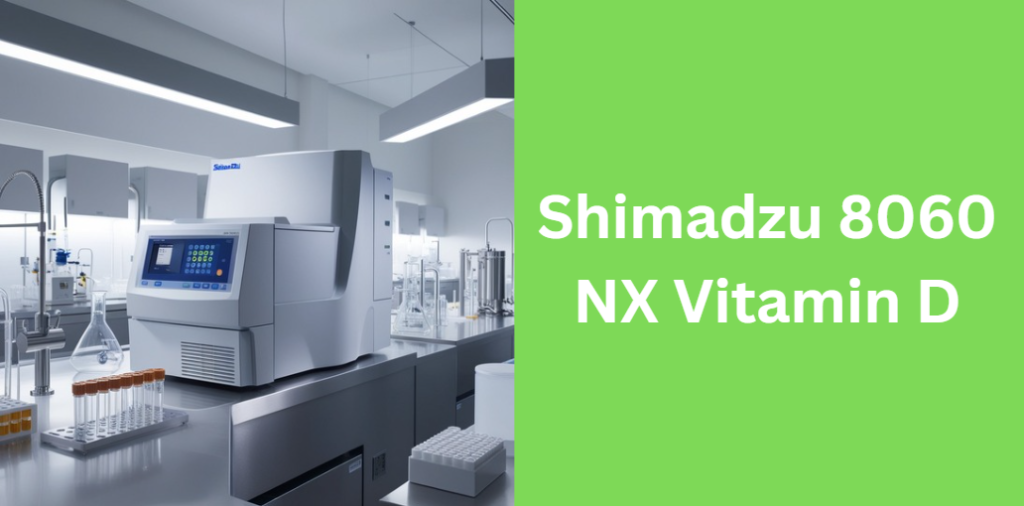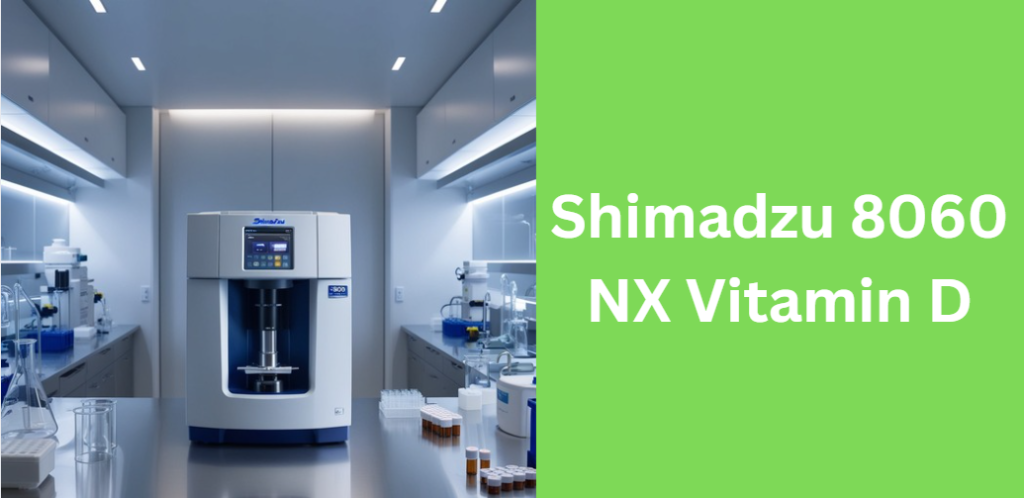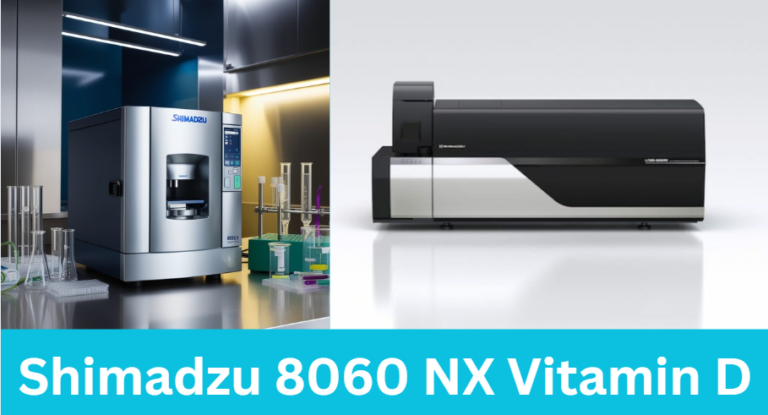
The Shimadzu 8060 NX Vitamin D system represents the pinnacle of analytical precision in the field of mass spectrometry. Designed with cutting-edge technology, the Shimadzu 8060 NX Vitamin D is the ultimate tool for laboratories looking to accurately measure vitamin D and its metabolites in biological samples.
Offering unmatched sensitivity, speed, and reliability, the Shimadzu 8060 NX Vitamin D has become the gold standard for vitamin D analysis across clinical, research, and pharmaceutical applications.
This advanced system is particularly beneficial for tackling the challenges associated with vitamin D analysis, which requires high accuracy due to the complexities involved in detecting trace levels of metabolites in the body.
By offering a combination of efficiency, enhanced resolution, and ease of use, the Shimadzu 8060 NX Vitamin D system is transforming how laboratories and healthcare professionals approach vitamin D quantification.
What is Shimadzu 8060 NX Vitamin D System

The Shimadzu 8060 NX Vitamin D system is a revolutionary triple quadrupole mass spectrometer that provides laboratories with a powerful tool for comprehensive analysis of vitamin D metabolites. This system is specially designed for high-throughput environments, offering unmatched precision for complex analyses.
At the heart of the Shimadzu 8060 NX Vitamin D system is the LC-MS/MS technology that ensures incredibly sensitive detection of vitamin D metabolites, including 25-hydroxyvitamin D (25(OH)D) and 1,25-dihydroxyvitamin D (1,25(OH)₂D).
This technology makes it easier to differentiate between metabolites and provide highly specific results, which are vital for clinical applications, where minute variations in vitamin D levels can significantly impact a patient’s health outcomes.
The Shimadzu 8060 NX Vitamin D is equipped with several advanced features designed to ensure precise quantification, including ultra-fast MRM transitions and high-resolution detection, which enable laboratories to get accurate results at faster speeds, enhancing productivity without sacrificing accuracy.
The Role of Vitamin D and the Need for Accurate Analysis

Vitamin D plays an integral role in maintaining overall health. It is essential for bone health, immune function, neurological health, and the prevention of chronic diseases such as osteoporosis, heart disease, and certain types of cancers.
As research on vitamin D continues to evolve, understanding the nuances of vitamin D metabolism and ensuring its adequate intake is becoming a crucial part of medical practice.
Vitamin D exists in several forms, with the two main metabolites measured in clinical practice being 25-hydroxyvitamin D (25(OH)D) and 1,25-dihydroxyvitamin D (1,25(OH)₂D). 25(OH)D is the most widely used marker for assessing vitamin D status, as it is the primary circulating form, while 1,25(OH)₂D is the active form, influencing calcium metabolism and immune response.
Accurately measuring these metabolites is essential for diagnosing deficiencies and guiding supplementation or treatment plans for patients. The Shimadzu 8060 NX Vitamin D system provides an effective solution by offering precise, accurate, and reliable quantification of these vitamin D metabolites, helping clinicians make informed decisions regarding patient care.
Challenges in Vitamin D Quantification

Quantifying vitamin D metabolites is inherently challenging for several reasons:
Low Concentrations of Metabolites
Vitamin D metabolites, particularly 25(OH)D, are present in very low concentrations in blood and serum samples. This makes it difficult for traditional immunoassays or enzyme-linked immunosorbent assays (ELISA) to accurately measure these metabolites, leading to potential inaccuracies in diagnosis.
Structural Similarities Between Metabolites
Another challenge in vitamin D quantification is the structural similarity between various vitamin D metabolites. For example, 25(OH)D and 1,25(OH)₂D share similar chemical structures, making their separation and identification difficult with traditional analytical methods.
Matrix Interference
Biological samples, such as serum or plasma, often contain numerous other compounds that can interfere with the analysis of vitamin D metabolites, leading to inaccurate results if not properly controlled.
The Shimadzu 8060 NX Vitamin D addresses these challenges by offering ultra-high sensitivity and the ability to distinguish between metabolites with high specificity. This makes it possible to detect and quantify vitamin D metabolites even in the presence of low concentrations and complex biological matrices.
How the Shimadzu 8060 NX Vitamin D Solves Analytical Challenges

The Shimadzu 8060 NX Vitamin D system is designed with advanced features that ensure accurate and reliable analysis of vitamin D metabolites. Key features include:
Enhanced Sensitivity for Low-Abundance Metabolites
The Shimadzu 8060 NX Vitamin D system utilizes highly efficient ion optics and a fast, sensitive detector to ensure precise analysis of low-abundance vitamin D metabolites. This heightened sensitivity ensures that even the most minute amounts of 25(OH)D or 1,25(OH)₂D can be detected, providing highly accurate results for diagnostic purposes.
Ultra-Fast MRM Transitions
The system’s ultra-fast Multiple Reaction Monitoring (MRM) transitions allow for rapid data collection without compromising the quality of results. This is particularly valuable in high-throughput laboratories where time efficiency is critical.
High Resolution for Accurate Quantification
The Shimadzu 8060 NX Vitamin D uses high-resolution detection technology, which helps resolve closely related metabolites that may be present in biological samples. This level of resolution ensures that each metabolite is quantified with the highest level of accuracy.
Robust Performance in Complex Matrices
The system’s design allows for reliable analysis in biological matrices, such as plasma, serum, or urine, where other compounds might cause interference. This ensures that the measurements of vitamin D metabolites are unaffected by matrix effects, leading to accurate and reproducible results.
Shimadzu 8060 NX Vitamin D: Method Packages for Simplified Workflows

One of the standout features of the Shimadzu 8060 NX Vitamin D system is its method packages, which are designed to streamline the process of vitamin D analysis. These pre-validated packages contain optimized conditions for the analysis of vitamin D metabolites, including:
- Pre-optimized chromatographic conditions for separating vitamin D metabolites.
- Validated mass spectrometry settings for accurate detection and quantification.
- Comprehensive calibration and validation protocols to ensure consistent performance.
These packages are designed to simplify the setup process, saving valuable time for laboratory technicians and ensuring consistent and reliable results.
Applications of the Shimadzu 8060 NX Vitamin D System

The Shimadzu 8060 NX Vitamin D is widely used in a variety of fields, offering benefits across multiple applications:
Clinical Diagnostics
In clinical diagnostics, the Shimadzu 8060 NX Vitamin D system is invaluable for determining vitamin D deficiency, monitoring supplementation, and evaluating bone health. Accurate measurement of vitamin D metabolites helps healthcare providers assess patient status and tailor treatment plans.
Pharmaceutical Research and Development
The Shimadzu 8060 NX Vitamin D system plays an essential role in pharmaceutical research, particularly in studying the pharmacokinetics of vitamin D analogs and other related compounds. The system provides researchers with the tools to analyze the metabolic fate of new drugs targeting vitamin D pathways.
Nutritional Research
Nutritional science benefits greatly from the ability to assess vitamin D status in populations, especially when evaluating the impact of dietary interventions or vitamin D supplementation. The Shimadzu 8060 NX Vitamin D system provides high-throughput, reliable results that help researchers better understand the role of vitamin D in human health.
FAQs About Shimadzu 8060 NX Vitamin D Analysis
What makes the Shimadzu 8060 NX Vitamin D system suitable for vitamin D analysis?
The Shimadzu 8060 NX Vitamin D system offers unparalleled sensitivity, speed, and accuracy, which is essential for detecting and quantifying low-abundance vitamin D metabolites. Its ability to resolve complex matrices ensures that it delivers precise results even in the most challenging samples.
How does the Shimadzu 8060 NX Vitamin D system improve upon traditional methods?
Traditional methods like immunoassays often suffer from cross-reactivity or lack of sensitivity. The Shimadzu 8060 NX Vitamin D system provides high specificity and is capable of analyzing complex samples, making it a more reliable and accurate choice for vitamin D analysis.
Can the Shimadzu 8060 NX Vitamin D system analyze multiple vitamin D metabolites simultaneously?
Yes, the Shimadzu 8060 NX Vitamin D system is capable of simultaneous analysis of multiple vitamin D metabolites, streamlining workflows and improving laboratory efficiency.
Conclusion
The Shimadzu 8060 NX Vitamin D system has set a new standard in the field of vitamin D analysis. With its unparalleled sensitivity, robustness, and ease of use, it is an essential tool for healthcare providers, pharmaceutical researchers, and nutritionists worldwide.
By offering high-resolution detection, ultra-fast MRM transitions, and accurate quantification of vitamin D metabolites, the Shimadzu 8060 NX Vitamin D helps ensure better health outcomes through more accurate diagnostics and treatments.
Affiliated Posts Like Shimadzu 8060 NX Vitamin D
MyBama: A Complete Guide to the University of Alabama’s Online Portal






